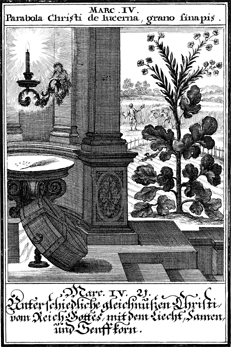Salt and light
Salt and Light are metaphors used by Jesus in the Sermon on the Mount, one of the key teachings in the Christian tradition. Found in the Gospel of Matthew (Matthew 5:13-16), these metaphors are part of a larger discourse that outlines the ethics and responsibilities of the followers of Jesus. This article explores the meanings and implications of these metaphors, their historical context, and their relevance in contemporary Christian thought.
Salt of the Earth[edit | edit source]
In Matthew 5:13, Jesus tells his followers, "You are the salt of the earth." In the ancient world, salt was a valuable commodity. It was used for preserving food, as a seasoning, and in various religious rituals. By calling his disciples "the salt of the earth," Jesus was emphasizing their value and their role in preserving the moral and spiritual health of the world. The metaphor also implies that Christians are to bring out the "flavor" of God's world, enhancing and enriching life.
However, Jesus also warns that if salt loses its taste, it becomes worthless and is thrown out and trampled underfoot. This serves as a caution to maintain one's faith and commitment to Christian values, lest one becomes ineffective in their role as a preserver of goodness.
Light of the World[edit | edit source]
Following the salt metaphor, Jesus declares in Matthew 5:14-16, "You are the light of the world. A city set on a hill cannot be hidden." Light is a universal symbol for truth, goodness, and divine revelation. In this context, Jesus is calling his followers to be a beacon of truth and goodness in a world often shrouded in darkness and sin.
The metaphor of a city on a hill emphasizes visibility and the importance of Christians living out their faith in such a way that others can see. The instruction to let one's light shine before others, so that they may see the good works and give glory to the Father in heaven, underscores the outward focus of Christian living. It's not just about personal salvation, but about witnessing to others through actions that reflect God's love and righteousness.
Historical Context[edit | edit source]
The metaphors of salt and light were particularly resonant in the historical context in which Jesus spoke. Salt was an essential commodity in the ancient world, not just for its culinary uses but also for its preservative qualities. Light, too, was a powerful symbol in a time when nightfall could mean complete darkness, and a lamp or a city on a hill could guide and provide safety.
These metaphors also reflect the broader themes of the Sermon on the Mount, which emphasizes humility, mercy, purity of heart, and peacemaking. Jesus' teachings in this sermon are often seen as a blueprint for Christian living, with the metaphors of salt and light serving as vivid illustrations of the impact that Christians are called to have on the world.
Contemporary Relevance[edit | edit source]
The metaphors of salt and light continue to inspire Christians today. They are seen as a call to active engagement with the world, rather than withdrawal or isolation. In a world facing challenges such as injustice, poverty, and moral decay, the call to be salt and light is as relevant as ever. Christians are encouraged to preserve what is good, bring flavor to life, illuminate truth, and work for justice and peace in a way that reflects the teachings of Jesus.
In contemporary Christian thought, these metaphors also emphasize the communal aspect of faith. Just as a single grain of salt or a solitary light can have limited impact, the collective action and witness of the Christian community can bring about significant change and healing in the world.
Conclusion[edit | edit source]
The metaphors of salt and light in the Sermon on the Mount are powerful reminders of the role and responsibility of Christians in the world. They call for a faith that is active, engaged, and visible—a faith that not only transforms the individual but also has a profound impact on society. As symbols of preservation, flavor, guidance, and illumination, salt and light encapsulate the essence of Christian witness in the world.
This article is a Christianity-related stub. You can help WikiMD by expanding it!
Search WikiMD
Ad.Tired of being Overweight? Try W8MD's physician weight loss program.
Semaglutide (Ozempic / Wegovy and Tirzepatide (Mounjaro / Zepbound) available.
Advertise on WikiMD
|
WikiMD's Wellness Encyclopedia |
| Let Food Be Thy Medicine Medicine Thy Food - Hippocrates |
Translate this page: - East Asian
中文,
日本,
한국어,
South Asian
हिन्दी,
தமிழ்,
తెలుగు,
Urdu,
ಕನ್ನಡ,
Southeast Asian
Indonesian,
Vietnamese,
Thai,
မြန်မာဘာသာ,
বাংলা
European
español,
Deutsch,
français,
Greek,
português do Brasil,
polski,
română,
русский,
Nederlands,
norsk,
svenska,
suomi,
Italian
Middle Eastern & African
عربى,
Turkish,
Persian,
Hebrew,
Afrikaans,
isiZulu,
Kiswahili,
Other
Bulgarian,
Hungarian,
Czech,
Swedish,
മലയാളം,
मराठी,
ਪੰਜਾਬੀ,
ગુજરાતી,
Portuguese,
Ukrainian
Medical Disclaimer: WikiMD is not a substitute for professional medical advice. The information on WikiMD is provided as an information resource only, may be incorrect, outdated or misleading, and is not to be used or relied on for any diagnostic or treatment purposes. Please consult your health care provider before making any healthcare decisions or for guidance about a specific medical condition. WikiMD expressly disclaims responsibility, and shall have no liability, for any damages, loss, injury, or liability whatsoever suffered as a result of your reliance on the information contained in this site. By visiting this site you agree to the foregoing terms and conditions, which may from time to time be changed or supplemented by WikiMD. If you do not agree to the foregoing terms and conditions, you should not enter or use this site. See full disclaimer.
Credits:Most images are courtesy of Wikimedia commons, and templates, categories Wikipedia, licensed under CC BY SA or similar.
Contributors: Prab R. Tumpati, MD

